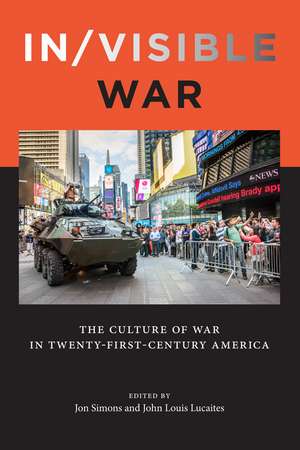In/visible War: The Culture of War in Twenty-first-Century America: POS Rewrite
Editat de Jon Simons, John Louis Lucaites Contribuţii de Nina Berman, David Campbell, Christopher J. Gilbert, Jeremy G. Gordon, Rebecca A. Adelman, Wendy Kozol, Jody Madeira, Roger Stahl, De Witt Douglas Kilgore, Claudia Breger, Purnima Bose, Diane Rubenstein, James Der Derianen Limba Engleză Paperback – 13 iun 2017 – vârsta ani
In/Visible
Waraddresses
a
paradox
of
twenty-first
century
American
warfare.
The
contemporary
visual
American
experience
of
war
is
ubiquitous,
and
yet
war
is
simultaneously
invisible
or
absent;
we
lack
a
lived
sense
that
“America”
is
at
war.
This
paradox
of
in/visibility
concerns
the
gap
between
the
experiences
of
war
zones
and
the
visual,
mediated
experience
of
war
in
public,
popular
culture,
which
absents
and
renders
invisible
the
former.
Large
portions
of
the
domestic
public
experience
war
only
at
a
distance.
For
these
citizens,
war
seems
abstract,
or
may
even
seem
to
have
disappeared
altogether
due
to
a
relative
absence
of
visual
images
of
casualties.
Perhaps
even
more
significantly,
wars
can
be
fought
without
sacrifice
by
the
vast
majority
of
Americans.
Yet, the normalization of twenty-first century war also renders it highly visible. War is made visible through popular, commercial, mediated culture. The spectacle of war occupies the contemporary public sphere in the forms of celebrations at athletic events and in films, video games, and other media, coming together as MIME, the Military-Industrial-Media-Entertainment Network.
Yet, the normalization of twenty-first century war also renders it highly visible. War is made visible through popular, commercial, mediated culture. The spectacle of war occupies the contemporary public sphere in the forms of celebrations at athletic events and in films, video games, and other media, coming together as MIME, the Military-Industrial-Media-Entertainment Network.
Preț: 174.26 lei
Preț vechi: 269.25 lei
-35% Nou
Puncte Express: 261
Preț estimativ în valută:
33.35€ • 34.77$ • 27.72£
33.35€ • 34.77$ • 27.72£
Carte indisponibilă temporar
Doresc să fiu notificat când acest titlu va fi disponibil:
Se trimite...
Preluare comenzi: 021 569.72.76
Specificații
ISBN-13: 9780813585376
ISBN-10: 0813585376
Pagini: 286
Ilustrații: 19 black-and-white and 12 color photographs
Dimensiuni: 152 x 229 x 20 mm
Greutate: 0.47 kg
Ediția:None
Editura: Rutgers University Press
Colecția Rutgers University Press
Seria POS Rewrite
ISBN-10: 0813585376
Pagini: 286
Ilustrații: 19 black-and-white and 12 color photographs
Dimensiuni: 152 x 229 x 20 mm
Greutate: 0.47 kg
Ediția:None
Editura: Rutgers University Press
Colecția Rutgers University Press
Seria POS Rewrite
Notă biografică
JON SIMONS is Reader in Media at Leeds Trinity University, United Kingdom. He is the author or editor of numerous books including Images: A Reader.
JOHN LOUIS LUCAITES is the associate dean for arts and humanities in the College of Arts and Sciences and provost professor of rhetoric in the department of English at Indiana University. His most recent work includes No Caption Needed: Photojournalism, Public Culture, and Liberal Democracy.
JOHN LOUIS LUCAITES is the associate dean for arts and humanities in the College of Arts and Sciences and provost professor of rhetoric in the department of English at Indiana University. His most recent work includes No Caption Needed: Photojournalism, Public Culture, and Liberal Democracy.
Cuprins
Acknowledgments
Introduction: The Paradoxical In/visibility of War
John Louis Lucaites and Jon Simons
Part I: Seeing War
Chapter 1: How Photojournalism Has Framed the War in Afghanistan
David Campbell
Chapter 2: Returning Soldiers and the In/visibility of Combat Trauma
Christopher J. Gilbert and John Louis Lucaites
Chapter 3: (Re)fashioning PTSD’s Warrior Project
Jeremy G. Gordon
Chapter 4: Unremarkable Suffering: Banality, Spectatorship, and War’s In/visibilities
Rebecca A. Adelman and Wendy Kozol
Transition
“War Is Fun,” a Photo-Essay
Nina Berman
Chapter 5: Laying bin Laden to Rest: A Case Study of Terrorism and the Politics of Visibility
Jody Madeira
Part II: Not Seeing War
Chapter 6: Digital War and the Public Mind: Call of Duty Reloaded, Decoded
Roger Stahl
Chapter 7: A Cinema of Consolation: Post-9/11 Super Invasion Fantasy
De Witt Douglas Kilgore
Chapter 8: Differential Configurations: In/visibility through the Lens of Kathryn Bigelow’s The Hurt Locker (2008)
Claudia Breger
Chapter 9: Canine Rescue, Civilian Casualties, and the Long Gulf War
Purnima Bose
Part III: Theorizing the In/visibility of War
Chapter 10: The In/visibility of Liberal Peace: Perpetual Peace and Enduring Freedom
Jon Simons
Chapter 11: Why War? Baudrillard, Derrida, and the Absolute Televisual Image
Diane Rubenstein
Chapter 12: War in the Twenty-first Century: Visible, Invisible, or Superpositional?
James Der Derian
Notes on Contributors
Photo Credits
Index
Introduction: The Paradoxical In/visibility of War
John Louis Lucaites and Jon Simons
Part I: Seeing War
Chapter 1: How Photojournalism Has Framed the War in Afghanistan
David Campbell
Chapter 2: Returning Soldiers and the In/visibility of Combat Trauma
Christopher J. Gilbert and John Louis Lucaites
Chapter 3: (Re)fashioning PTSD’s Warrior Project
Jeremy G. Gordon
Chapter 4: Unremarkable Suffering: Banality, Spectatorship, and War’s In/visibilities
Rebecca A. Adelman and Wendy Kozol
Transition
“War Is Fun,” a Photo-Essay
Nina Berman
Chapter 5: Laying bin Laden to Rest: A Case Study of Terrorism and the Politics of Visibility
Jody Madeira
Part II: Not Seeing War
Chapter 6: Digital War and the Public Mind: Call of Duty Reloaded, Decoded
Roger Stahl
Chapter 7: A Cinema of Consolation: Post-9/11 Super Invasion Fantasy
De Witt Douglas Kilgore
Chapter 8: Differential Configurations: In/visibility through the Lens of Kathryn Bigelow’s The Hurt Locker (2008)
Claudia Breger
Chapter 9: Canine Rescue, Civilian Casualties, and the Long Gulf War
Purnima Bose
Part III: Theorizing the In/visibility of War
Chapter 10: The In/visibility of Liberal Peace: Perpetual Peace and Enduring Freedom
Jon Simons
Chapter 11: Why War? Baudrillard, Derrida, and the Absolute Televisual Image
Diane Rubenstein
Chapter 12: War in the Twenty-first Century: Visible, Invisible, or Superpositional?
James Der Derian
Notes on Contributors
Photo Credits
Index
Recenzii
"Can
a
war
be
hidden
in
plain
sight?
Every
day.
This
thoughtful
volume
explores
how
contemporary
media
are
normalizing
war,
and
why
the
paradoxes
of
war’s
invisibility
challenge
civic
spectatorship."
"Provocative."
"In/Visible War: the Culture of War in Twenty-First-Century America is an amazing read about images of war and also how we really do not have a clue as to what these men and women in uniform go through on a day-to-day basis. A picture can make us see, but we can never know the 'truth.'"
Descriere
In/Visible War addresses a paradox of twenty-first century American warfare. The contemporary visual American experience of war is ubiquitous, and yet war is simultaneously invisible or absent; we lack a lived sense that “America” is at war. This paradox of in/visibility concerns the gap between the experiences of war zones and the visual, mediated experience of war in public, popular culture, which absents and renders invisible the former. Large portions of the domestic public experience war only at a distance. For these citizens, war seems abstract, or may even seem to have disappeared altogether due to a relative absence of visual images of casualties. Perhaps even more significantly, wars can be fought without sacrifice by the vast majority of Americans.
Yet, the normalization of twenty-first century war also renders it highly visible. War is made visible through popular, commercial, mediated culture. The spectacle of war occupies the contemporary public sphere in the forms of celebrations at athletic events and in films, video games, and other media, coming together as MIME, the Military-Industrial-Media-Entertainment Network.
Yet, the normalization of twenty-first century war also renders it highly visible. War is made visible through popular, commercial, mediated culture. The spectacle of war occupies the contemporary public sphere in the forms of celebrations at athletic events and in films, video games, and other media, coming together as MIME, the Military-Industrial-Media-Entertainment Network.




